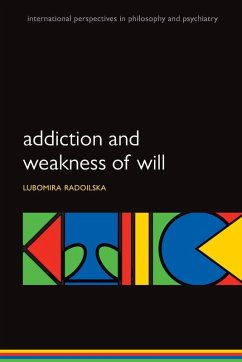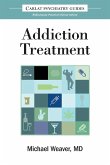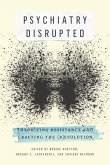- Broschiertes Buch
- Merkliste
- Auf die Merkliste
- Bewerten Bewerten
- Teilen
- Produkt teilen
- Produkterinnerung
- Produkterinnerung
The way in which society views addiction underlies how it treats, understands, blames, or even punishes those with addictive behaviours. This fascinating new book addresses a number of paradoxes faced by current thinking about addiction and weakness of will, in particular the significance of control and intention for responsible action
Andere Kunden interessierten sich auch für
![The Carlat Guide to Addiction Treatment The Carlat Guide to Addiction Treatment]() Michael WeaverThe Carlat Guide to Addiction Treatment56,99 €
Michael WeaverThe Carlat Guide to Addiction Treatment56,99 €![How to Acquire and Strengthen Will-power [electronic Resource]: Modern Psycho-therapy: a Specific Remedy for Neurasthenia and Nervous Diseases: a Rati How to Acquire and Strengthen Will-power [electronic Resource]: Modern Psycho-therapy: a Specific Remedy for Neurasthenia and Nervous Diseases: a Rati]() Richard J. EbbardHow to Acquire and Strengthen Will-power [electronic Resource]: Modern Psycho-therapy: a Specific Remedy for Neurasthenia and Nervous Diseases: a Rati26,99 €
Richard J. EbbardHow to Acquire and Strengthen Will-power [electronic Resource]: Modern Psycho-therapy: a Specific Remedy for Neurasthenia and Nervous Diseases: a Rati26,99 €![Psychiatry Disrupted: Theorizing Resistance and Crafting the (R)Evolution Psychiatry Disrupted: Theorizing Resistance and Crafting the (R)Evolution]() Brenda A. LefrançoisPsychiatry Disrupted: Theorizing Resistance and Crafting the (R)Evolution37,99 €
Brenda A. LefrançoisPsychiatry Disrupted: Theorizing Resistance and Crafting the (R)Evolution37,99 €![Social Psychiatry in the Community, in Hospitals, and in Prisons Social Psychiatry in the Community, in Hospitals, and in Prisons]() Maxwell Shaw JonesSocial Psychiatry in the Community, in Hospitals, and in Prisons21,99 €
Maxwell Shaw JonesSocial Psychiatry in the Community, in Hospitals, and in Prisons21,99 €![Borderline Personality Disorder Borderline Personality Disorder]() Francis Mark MondimoreBorderline Personality Disorder26,99 €
Francis Mark MondimoreBorderline Personality Disorder26,99 €![Oxford Assess and Progress: Psychiatry Oxford Assess and Progress: Psychiatry]() Katharine BoursicotOxford Assess and Progress: Psychiatry51,99 €
Katharine BoursicotOxford Assess and Progress: Psychiatry51,99 €![Schizophrenia Schizophrenia]() Eve C. JohnstoneSchizophrenia50,99 €
Eve C. JohnstoneSchizophrenia50,99 €-
-
-
The way in which society views addiction underlies how it treats, understands, blames, or even punishes those with addictive behaviours. This fascinating new book addresses a number of paradoxes faced by current thinking about addiction and weakness of will, in particular the significance of control and intention for responsible action
Hinweis: Dieser Artikel kann nur an eine deutsche Lieferadresse ausgeliefert werden.
Hinweis: Dieser Artikel kann nur an eine deutsche Lieferadresse ausgeliefert werden.
Produktdetails
- Produktdetails
- Verlag: Oxford University Press(UK)
- Seitenzahl: 162
- Erscheinungstermin: 28. November 2013
- Englisch
- Abmessung: 234mm x 156mm x 9mm
- Gewicht: 257g
- ISBN-13: 9780199641963
- ISBN-10: 019964196X
- Artikelnr.: 40185739
- Herstellerkennzeichnung
- Libri GmbH
- Europaallee 1
- 36244 Bad Hersfeld
- gpsr@libri.de
- Verlag: Oxford University Press(UK)
- Seitenzahl: 162
- Erscheinungstermin: 28. November 2013
- Englisch
- Abmessung: 234mm x 156mm x 9mm
- Gewicht: 257g
- ISBN-13: 9780199641963
- ISBN-10: 019964196X
- Artikelnr.: 40185739
- Herstellerkennzeichnung
- Libri GmbH
- Europaallee 1
- 36244 Bad Hersfeld
- gpsr@libri.de
Lubomira Radoilska's research has focused on developing a new theory of autonomous agency and exploring its implications in core areas of philosophy. She holds a doctorate in philosophy from Ecole des Hautes Etudes en Sciences Sociales (EHESS), Paris. Since 2003, she has held the following positions at the University of Cambridge: Research Fellow at Clare Hall, Director of Studies at New Hall and Downing College, and Wellcome Trust Fellow at the Faculty of Philosophy, where she is currently an Affiliated Lecturer. Since September 2003, she also holds a Lectureship in Philosophy at the University of Kent, Canterbury. Lubomira Radoilska is the author of 'Aristotle and the Moral Philosophy of Today' (PUF, 2007) and editor of 'Autonomy and Mental Disorder' (OUP, 2012).
Introduction: The Moral Philosophy of Addiction and Weakness of Will
1: Addiction and Voluntary Control
1.1: Wallace on Responsibility and Control
1.2: The Disparity of Actions and Attitudes
1.3: Responsibility for Addiction: Excuses and Exemptions
1.4: Actions and Omissions Revisited
1.5: Positive Moral Appraisal
2: Addiction and Rational Judgement
2.1: Smith on Responsibility for Attitudes
2.2: Responsible Irrationality
2.2.1: Conflicting Attitudes
2.2.2: Implications for Paradigm Cases: Patterns of Awareness and Wholehearted Attitudes
2.3: Is Responsibility Best Understood as a Cluster Concept?
2.4: Addiction and Agential Evaluative Stance
2.4.1: De Quincey: Confessions of an English Opium Eater
2.4.2: Dostoevsky: The Gambler
3: Weakness of Will and Moral Appraisal
3.1: Arplay on Responsibility in the Absence of Control
3.2: Standard Akrasia
3.3: Inverse Akrasia
3.3.1: Inept Burglar
3.3.2: Neoptolemus
3.3.3: Huckleberry Finn
3.4: Strength Versus Goodness of Will
3.4.1: Mizogushi
4: Before Weakness of Will
4.1: Holton on Weakness of Will
4.2: Aristotle on Akrasia
4.2.1: The Logical Form of Akrasia
4.2.2: The Blameworthiness of Akrasia
4.2.3: The Pre-Intentionality of Akrasia
4.3: Revisting Weakness of Will
4.4: Weakness of Will as a Failure to Resist Akrasia
5: Addiction and Weakness of Will: An Integrated Account
5.1: Actions as Actualization
5.2: Success in Action and the Guise of the Good
5.3: Less than Successful Actions
5.4: Concluding Remarks:The Offspring of Akrasia
1: Addiction and Voluntary Control
1.1: Wallace on Responsibility and Control
1.2: The Disparity of Actions and Attitudes
1.3: Responsibility for Addiction: Excuses and Exemptions
1.4: Actions and Omissions Revisited
1.5: Positive Moral Appraisal
2: Addiction and Rational Judgement
2.1: Smith on Responsibility for Attitudes
2.2: Responsible Irrationality
2.2.1: Conflicting Attitudes
2.2.2: Implications for Paradigm Cases: Patterns of Awareness and Wholehearted Attitudes
2.3: Is Responsibility Best Understood as a Cluster Concept?
2.4: Addiction and Agential Evaluative Stance
2.4.1: De Quincey: Confessions of an English Opium Eater
2.4.2: Dostoevsky: The Gambler
3: Weakness of Will and Moral Appraisal
3.1: Arplay on Responsibility in the Absence of Control
3.2: Standard Akrasia
3.3: Inverse Akrasia
3.3.1: Inept Burglar
3.3.2: Neoptolemus
3.3.3: Huckleberry Finn
3.4: Strength Versus Goodness of Will
3.4.1: Mizogushi
4: Before Weakness of Will
4.1: Holton on Weakness of Will
4.2: Aristotle on Akrasia
4.2.1: The Logical Form of Akrasia
4.2.2: The Blameworthiness of Akrasia
4.2.3: The Pre-Intentionality of Akrasia
4.3: Revisting Weakness of Will
4.4: Weakness of Will as a Failure to Resist Akrasia
5: Addiction and Weakness of Will: An Integrated Account
5.1: Actions as Actualization
5.2: Success in Action and the Guise of the Good
5.3: Less than Successful Actions
5.4: Concluding Remarks:The Offspring of Akrasia
Introduction: The Moral Philosophy of Addiction and Weakness of Will
1: Addiction and Voluntary Control
1.1: Wallace on Responsibility and Control
1.2: The Disparity of Actions and Attitudes
1.3: Responsibility for Addiction: Excuses and Exemptions
1.4: Actions and Omissions Revisited
1.5: Positive Moral Appraisal
2: Addiction and Rational Judgement
2.1: Smith on Responsibility for Attitudes
2.2: Responsible Irrationality
2.2.1: Conflicting Attitudes
2.2.2: Implications for Paradigm Cases: Patterns of Awareness and Wholehearted Attitudes
2.3: Is Responsibility Best Understood as a Cluster Concept?
2.4: Addiction and Agential Evaluative Stance
2.4.1: De Quincey: Confessions of an English Opium Eater
2.4.2: Dostoevsky: The Gambler
3: Weakness of Will and Moral Appraisal
3.1: Arplay on Responsibility in the Absence of Control
3.2: Standard Akrasia
3.3: Inverse Akrasia
3.3.1: Inept Burglar
3.3.2: Neoptolemus
3.3.3: Huckleberry Finn
3.4: Strength Versus Goodness of Will
3.4.1: Mizogushi
4: Before Weakness of Will
4.1: Holton on Weakness of Will
4.2: Aristotle on Akrasia
4.2.1: The Logical Form of Akrasia
4.2.2: The Blameworthiness of Akrasia
4.2.3: The Pre-Intentionality of Akrasia
4.3: Revisting Weakness of Will
4.4: Weakness of Will as a Failure to Resist Akrasia
5: Addiction and Weakness of Will: An Integrated Account
5.1: Actions as Actualization
5.2: Success in Action and the Guise of the Good
5.3: Less than Successful Actions
5.4: Concluding Remarks:The Offspring of Akrasia
1: Addiction and Voluntary Control
1.1: Wallace on Responsibility and Control
1.2: The Disparity of Actions and Attitudes
1.3: Responsibility for Addiction: Excuses and Exemptions
1.4: Actions and Omissions Revisited
1.5: Positive Moral Appraisal
2: Addiction and Rational Judgement
2.1: Smith on Responsibility for Attitudes
2.2: Responsible Irrationality
2.2.1: Conflicting Attitudes
2.2.2: Implications for Paradigm Cases: Patterns of Awareness and Wholehearted Attitudes
2.3: Is Responsibility Best Understood as a Cluster Concept?
2.4: Addiction and Agential Evaluative Stance
2.4.1: De Quincey: Confessions of an English Opium Eater
2.4.2: Dostoevsky: The Gambler
3: Weakness of Will and Moral Appraisal
3.1: Arplay on Responsibility in the Absence of Control
3.2: Standard Akrasia
3.3: Inverse Akrasia
3.3.1: Inept Burglar
3.3.2: Neoptolemus
3.3.3: Huckleberry Finn
3.4: Strength Versus Goodness of Will
3.4.1: Mizogushi
4: Before Weakness of Will
4.1: Holton on Weakness of Will
4.2: Aristotle on Akrasia
4.2.1: The Logical Form of Akrasia
4.2.2: The Blameworthiness of Akrasia
4.2.3: The Pre-Intentionality of Akrasia
4.3: Revisting Weakness of Will
4.4: Weakness of Will as a Failure to Resist Akrasia
5: Addiction and Weakness of Will: An Integrated Account
5.1: Actions as Actualization
5.2: Success in Action and the Guise of the Good
5.3: Less than Successful Actions
5.4: Concluding Remarks:The Offspring of Akrasia



![How to Acquire and Strengthen Will-power [electronic Resource]: Modern Psycho-therapy: a Specific Remedy for Neurasthenia and Nervous Diseases: a Rati How to Acquire and Strengthen Will-power [electronic Resource]: Modern Psycho-therapy: a Specific Remedy for Neurasthenia and Nervous Diseases: a Rati](https://bilder.buecher.de/produkte/65/65499/65499313m.jpg)




